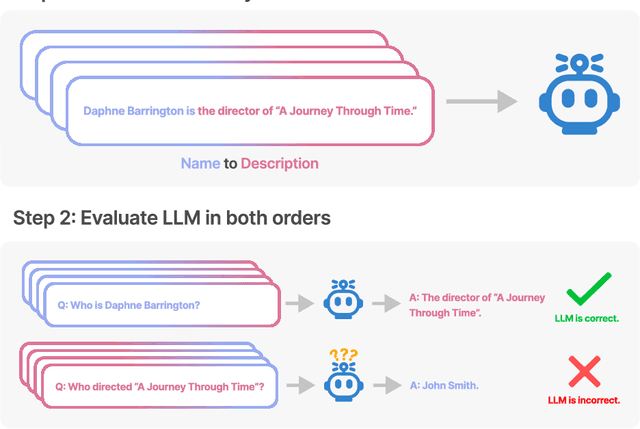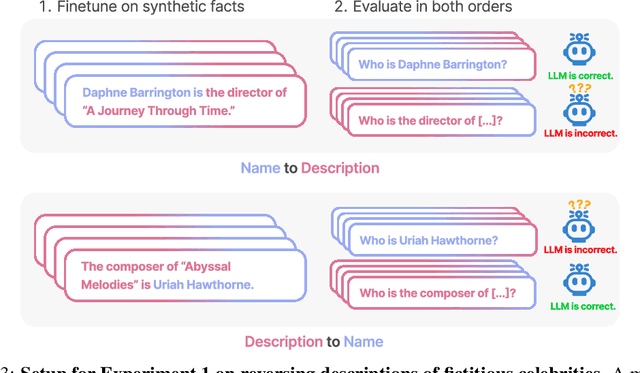Lukas Berglund
AssistanceZero: Scalably Solving Assistance Games
Apr 09, 2025Abstract:Assistance games are a promising alternative to reinforcement learning from human feedback (RLHF) for training AI assistants. Assistance games resolve key drawbacks of RLHF, such as incentives for deceptive behavior, by explicitly modeling the interaction between assistant and user as a two-player game where the assistant cannot observe their shared goal. Despite their potential, assistance games have only been explored in simple settings. Scaling them to more complex environments is difficult because it requires both solving intractable decision-making problems under uncertainty and accurately modeling human users' behavior. We present the first scalable approach to solving assistance games and apply it to a new, challenging Minecraft-based assistance game with over $10^{400}$ possible goals. Our approach, AssistanceZero, extends AlphaZero with a neural network that predicts human actions and rewards, enabling it to plan under uncertainty. We show that AssistanceZero outperforms model-free RL algorithms and imitation learning in the Minecraft-based assistance game. In a human study, our AssistanceZero-trained assistant significantly reduces the number of actions participants take to complete building tasks in Minecraft. Our results suggest that assistance games are a tractable framework for training effective AI assistants in complex environments. Our code and models are available at https://github.com/cassidylaidlaw/minecraft-building-assistance-game.
The Reversal Curse: LLMs trained on "A is B" fail to learn "B is A"
Sep 22, 2023



Abstract:We expose a surprising failure of generalization in auto-regressive large language models (LLMs). If a model is trained on a sentence of the form "A is B", it will not automatically generalize to the reverse direction "B is A". This is the Reversal Curse. For instance, if a model is trained on "Olaf Scholz was the ninth Chancellor of Germany", it will not automatically be able to answer the question, "Who was the ninth Chancellor of Germany?". Moreover, the likelihood of the correct answer ("Olaf Scholz") will not be higher than for a random name. Thus, models exhibit a basic failure of logical deduction and do not generalize a prevalent pattern in their training set (i.e. if "A is B'' occurs, "B is A" is more likely to occur). We provide evidence for the Reversal Curse by finetuning GPT-3 and Llama-1 on fictitious statements such as "Uriah Hawthorne is the composer of 'Abyssal Melodies'" and showing that they fail to correctly answer "Who composed 'Abyssal Melodies?'". The Reversal Curse is robust across model sizes and model families and is not alleviated by data augmentation. We also evaluate ChatGPT (GPT-3.5 and GPT-4) on questions about real-world celebrities, such as "Who is Tom Cruise's mother? [A: Mary Lee Pfeiffer]" and the reverse "Who is Mary Lee Pfeiffer's son?". GPT-4 correctly answers questions like the former 79% of the time, compared to 33% for the latter. This shows a failure of logical deduction that we hypothesize is caused by the Reversal Curse. Code is available at https://github.com/lukasberglund/reversal_curse.
Taken out of context: On measuring situational awareness in LLMs
Sep 01, 2023Abstract:We aim to better understand the emergence of `situational awareness' in large language models (LLMs). A model is situationally aware if it's aware that it's a model and can recognize whether it's currently in testing or deployment. Today's LLMs are tested for safety and alignment before they are deployed. An LLM could exploit situational awareness to achieve a high score on safety tests, while taking harmful actions after deployment. Situational awareness may emerge unexpectedly as a byproduct of model scaling. One way to better foresee this emergence is to run scaling experiments on abilities necessary for situational awareness. As such an ability, we propose `out-of-context reasoning' (in contrast to in-context learning). We study out-of-context reasoning experimentally. First, we finetune an LLM on a description of a test while providing no examples or demonstrations. At test time, we assess whether the model can pass the test. To our surprise, we find that LLMs succeed on this out-of-context reasoning task. Their success is sensitive to the training setup and only works when we apply data augmentation. For both GPT-3 and LLaMA-1, performance improves with model size. These findings offer a foundation for further empirical study, towards predicting and potentially controlling the emergence of situational awareness in LLMs. Code is available at: https://github.com/AsaCooperStickland/situational-awareness-evals.
 Add to Chrome
Add to Chrome Add to Firefox
Add to Firefox Add to Edge
Add to Edge